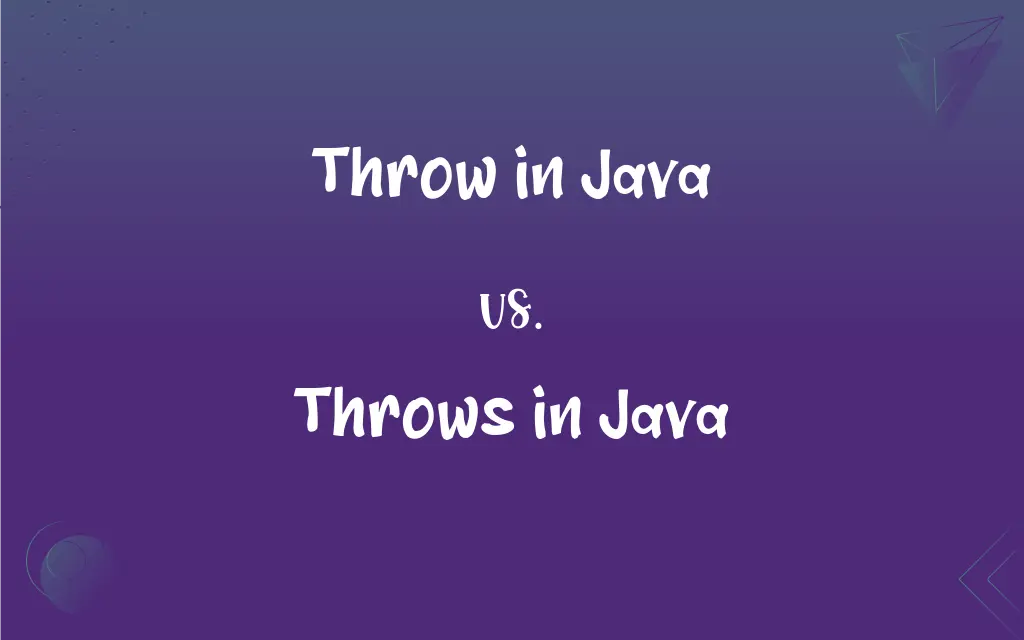Throw in Java vs. Throws in Java: What's the Difference?
Edited by Harlon Moss || By Janet White || Published on February 13, 2024
In Java, 'throw' is used to explicitly throw an exception, while 'throws' declares that a method may throw exceptions.

Key Differences
'Throw' in Java is a keyword used within a method to explicitly throw an exception, signaling an abnormal condition. 'throws', on the other hand, is used in a method's signature to indicate that the method might throw one or more exceptions.
The 'throw' keyword is followed by an instance of an exception class, allowing programmers to create a custom error condition. In contrast, 'throws' is followed by exception class names, declaring the types of exceptions that a method could potentially throw.
Using 'throw', developers can control the flow of the program by throwing exceptions under specific conditions. The 'throws' clause, however, is a way to notify the callers of a method that they must handle the potential exceptions.
When 'throw' is used, it immediately exits the method after the exception is thrown. With 'throws', the method execution continues until an exception occurs or the method completes normally.
'Throw' is essential for implementing custom exception handling, whereas 'throws' is crucial for creating a robust API that communicates possible failure conditions to its users.
ADVERTISEMENT
Comparison Chart
Usage
To explicitly throw a specific exception
To declare exceptions a method might throw
Syntax
Followed by an exception instance
Followed by one or more exception class names
Location
Inside a method
In the method signature
Effect on Method Execution
Exits the method immediately after the throw
Method continues execution until an exception occurs
Primary Purpose
To create and throw custom exceptions
To inform method callers of potential exceptions
ADVERTISEMENT
Throw in Java and Throws in Java Definitions
Throw in Java
It enables custom error signaling.
Throw new CustomException(Custom error message);
Throws in Java
'throws' declares potential exceptions.
Public void readFile() throws IOException { ... }
Throw in Java
It's used for manual exception handling.
If (x < 0) throw new ArithmeticException(Negative value);
Throws in Java
It's used in method signatures.
Public int divide(int a, int b) throws ArithmeticException { ... }
Throw in Java
'throw' triggers a specific exception.
Throw new IllegalArgumentException(Invalid input);
Throws in Java
It's used for exception declaration, not handling.
Public void processData() throws DataFormatException, NullDataException { ... }
Throw in Java
'throw' is used within method bodies.
If (user == null) throw new NullPointerException(User is null);
Throws in Java
'throws' helps in API design.
Public void saveFile() throws FileSaveException { ... }
Throw in Java
'throw' directs the program to exit a method.
Throw new IOException(File not found);
Throws in Java
'throws' indicates to handle exceptions externally.
Public void connect() throws SQLException, TimeoutException { ... }
FAQs
Can 'throw' be used for multiple exceptions?
No, 'throw' can only throw one exception at a time.
How many exceptions can 'throws' declare?
It can declare multiple exceptions.
Where is 'throw' used in Java code?
Within the method body.
What does 'throw' do in Java?
It explicitly throws an exception.
Can you omit 'throws' for runtime exceptions?
Yes, runtime exceptions don't need to be declared.
Where do you specify 'throws' in Java?
In the method signature.
Does 'throws' handle the exception?
No, it only declares that an exception might occur.
Is 'throws' mandatory for checked exceptions?
Yes, for checked exceptions, 'throws' is required.
What happens after 'throw' is executed?
The method execution stops and control is transferred to the caller.
What is the purpose of 'throws' in Java?
To declare possible exceptions a method could throw.
Can 'throw' be used without 'throws'?
Yes, especially for unchecked exceptions.
Is 'throw' necessary for all exceptions?
No, only for unchecked exceptions or custom exceptions.
Does 'throws' affect the flow of a program?
No, it doesn't affect the flow unless an exception is actually thrown.
Should all methods have 'throws'?
No, only if they might throw checked exceptions.
Can you catch an exception with 'throw'?
No, 'throw' is for throwing, not catching exceptions.
Can 'throws' be used in any method?
Yes, but it's meaningful in contexts where exceptions are expected.
Can constructors have 'throws'?
Yes, constructors can declare exceptions with 'throws'.
Are 'throw' and 'throws' related to try-catch blocks?
Yes, they're part of Java's exception handling mechanism, complementing try-catch.
What types of exceptions require 'throw'?
Mainly unchecked exceptions or custom-defined exceptions.
Does 'throw' create a new exception?
Yes, it creates and throws a new exception instance.
About Author
Written by
Janet WhiteJanet White has been an esteemed writer and blogger for Difference Wiki. Holding a Master's degree in Science and Medical Journalism from the prestigious Boston University, she has consistently demonstrated her expertise and passion for her field. When she's not immersed in her work, Janet relishes her time exercising, delving into a good book, and cherishing moments with friends and family.
Edited by
Harlon MossHarlon is a seasoned quality moderator and accomplished content writer for Difference Wiki. An alumnus of the prestigious University of California, he earned his degree in Computer Science. Leveraging his academic background, Harlon brings a meticulous and informed perspective to his work, ensuring content accuracy and excellence.







































































